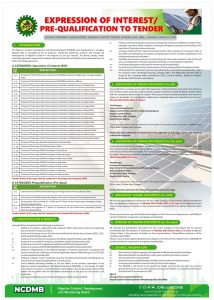December 22, (THEWILL) – The Federal Government has launched the Baseline Report and Realignment of the National Statistical System with Sustainable Development Goals (SDGs) 2020.
The development is aimed at ensuring reliable and accurate data for the implementation of the programme.
Nigeria’s Vice President, Professor Yemi Osinbajo, who launched the report, also commissioned 19 units of ambulances; an intervention by Office of the Senior Special Assistant to the President on Sustainable Development Goals (OSSAP-SDGs) aimed at strengthening the healthcare system at the sub-national level in Nigeria and promoting SDG-3 on good health and well-being.
The report was jointly done by OSSAP-SDGs and the National Bureau of Statistics (NBS).
According to the Vice President, the Federal Government integrated it in its policies and programmes to ensure sustainable development planning.
He said the approach had been adopted in all programmes and policies of the President Muhammadu Buhari administration since its inception.
The Vice-president in a statement issued by his Spokesman, Laolu Akande, said , “This is precisely the approach that we have taken beginning from the Economic Recovery and Growth Plan (2017 – 2020); the National Poverty Reduction with Growth Strategy (NPGRS); the Economic Sustainability Plan (ESP)—our short-term response to the adverse impact of the COVID-19 Pandemic;—and now the National Development Plan– 2021-2025 which was approved by the Federal Executive Council only last month.
“Its core components include human capital development, infrastructure and social development all of which are vehicles for achieving the SDGs.
“More specifically, the Plan identifies as areas of emphasis and action, agriculture, food security and rural development; water resources, sanitation, social protection and health and nutrition. These thematic areas mirror the SDGs and anchor the National Development Plan very tangibly to the achievement of the Goals.
“Our approach ensures that the SDGs are central to our national development efforts and are indeed policy priorities for the foreseeable future.
“Clearly all of these policy and planning documents bear the imprint of the SDGs as overarching national priorities.”
The Vice-president said that the federal government was committed to guaranteeing the sustained production of relevant statistical information needed for effective tracking and monitoring of the SDGs in Nigeria.
He said the launch of the report was the culmination of a process which began in 2016 for monitoring and evaluating the progress made in the implementation of the SDGs in Nigeria, adding that the achievement of the SDGs would be crucial to ending poverty, hunger, and disease, and for safeguarding the environment.
“For our administration, our objective of achieving sustainable development , which means creating wealth, decent jobs, reducing poverty, addressing the issues of climate change – is both consistent with the aspirations of the SDGs and central to our entire vision for the country .
“This is why in May 2019, Mr. President made a public commitment to lifting approximately 100 million Nigerians out of poverty within a 10-year period”, he said.
Osinbajo pointed out that Nigeria commenced the ‘Decade of Action’ for the SDGs, and had started recording modest progress on poverty reduction the COVID-19 pandemic emerged to undermine the prospects of achieving our aspirations.
“The pandemic, as we all know, resulted in an unprecedented global disruption of economies. While wealthier countries were able to effectively fund massive stimulus and social protection plans to deal with the impact of the plague, developing countries including Nigeria suffered disproportionately due to their resource constraints.
“Yet, to its credit, despite the restrictions occasioned by the COVID-19 outbreak and its fallouts , our SDG Office in Nigeria succeeded in putting in place effective institutional mechanisms at the national and sub-national levels to drive the implementation of the SDGs across the country.
“During this difficult period, Nigeria successfully presented its Second Voluntary National Review Report on the SDGs to the United Nations High-Level Political Forum (HLPF) on Sustainable Development sometime in July 2020.
“The 2020 Voluntary National Review process was conducted by the deployment of ICT platforms to conduct virtual consultations across all the key segments of the society.
“The key findings identified the major successes as well as the challenges that must be addressed if we must achieve the SDGs by the year 2030.
“There is no question that the Nigeria SDGs Implementation Plan (2020-2030) offers a coherent pathway for achieving the expected outcomes in the next decade”, the Vice-president said as he identified the increased range of reporting from 126 indicators recorded in the 2016 baseline Report to the 141 indicators in the current 2020 report as marked improvement.






